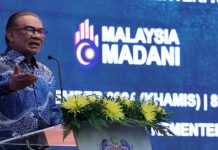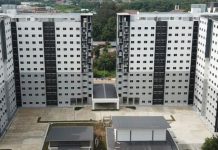Highlights:
- Lombok quake death toll rises to 98
- Government taking proactive steps to increase FDI
- Sarawak-China trade at RM15.8 bln last year
- Singapore Exchange amends listing rules
- Singtel launches FutureNow Innovation Centre
Lombok quake death toll rises to 98
The death toll from yesterday’s earthquake in Lombok has risen to 98. National Disaster Mitigation Agency spokesman Sutopo Purwo Nugroho said the number of deaths would increase as rescuers reach cut-off areas in north Lombok. The ruins of a mosque that collapsed in Lading-Lading village while people prayed inside was being pulled apart by a backhoe in search of victims. An operation is underway to evacuate thousands of tourists. So far, up to 2,700 tourists have been moved from the Gili Islands, according to Nugroho. He added that Lombok’s airport was now open around the clock and had significantly increased its flight schedule. The epicenter of the 6.9 magnitude quake was in northern Lombok, a more residential, less developed part of the island. The majority of Lombok’s tourist resorts are on the island’s southern coast.
Government taking proactive steps to increase FDI
The government will continue to take proactive measures to increase foreign direct investments (FDI) by giving more attention to high-quality investments which can stimulate the economy. Deputy International Trade and Industry Minister, Dr Ong Kian Ming said as a country moving towards developed nation status, focus would be given to high-quality and high-technology investments, as well as reducing the dependency on foreign labour. Meanwhile, he said that from May to June, three FDI projects amounting to RM16.4 million from the manufacturing sector were closed, stopped or relocated. “Based on the value of investments, there were from small-scale companies,” he said. Dr Ong said among the factors influencing FDI outflows were market uncertainties and contraction in the global economy, which caused investors to restructure their operations and investment strategy. The technology shift towards Industry 4.0, he said, has caused labour-intensive industries difficulties in optimising their operations and maintaining long-term profit in Malaysia. “The increase in labour cost had contributed to the outflow from labour intensive sectors.
Sarawak-China trade at RM15.8 bln last year
Trade between Sarawak and China stood at RM15.8 billion last year, with Sarawak’s exports recorded at RM10.1 billion while imports amounted to RM5.7 billion. Chief Minister Datuk Patinggi Abang Johari Tun Openg said the business collaboration between the two countries is in Liquified Natural Gas (LNG) and petroleum products, palm oil, timber products and electrical components, manufactured goods, machinery and food. He said as China is leading in innovation and showcases the acceleration of its economic transformation through the Digital Economy, Sarawak believes that there are opportunities for the state to learn from the country in transforming its economy through the Digital Economy. “Especially Small and Medium Industries, they need to benchmark or adopt a similar business model in order to be successful in e-Commerce. With online presence, the world is our market,” he said in his keynote address at the Sarawak-China Business Forum in Kuching.
SGX amends listing rules
The Singapore Exchange (SGX) will amend its listing rules after the central bank issued a revised corporate governance code that aims to encourage board renewal and strengthen director independence. The Code of Corporate Governance was revised after the Monetary Authority of Singapore (MAS) accepted a slew of recommendations by the Corporate Governance Council. The changes include strengthening director independence by reducing their shareholding threshold from 10 per cent to 5 per cent, and limiting the tenure for independent directors to nine years through a two-tier shareholders’ vote. To enhance board diversity, at least one-third of the board should be made up of independent directors – unless the chairman is not independent, in which case the majority should comprise of independent directors. Otherwise, the majority of the board should comprise of non-executive directors. Companies must also disclose their board diversity policy and the progress made, MAS said. The amendments to SGX’s listing rules will take effect on 1 January next year, except for the rules on the nine-year tenure for independent directors and the requirement for independent directors to comprise one-third of the board. These two rules will take effect on 1 January 2022.
Singtel launches FutureNow Innovation Centre
Singtel today launched its FutureNow Innovation Centre (FIC) to help enterprises accelerate their digital transformation to remain competitive and relevant in the digital economy, in line with the Government’s drive to encourage innovation and transformation across industries. The FIC is a key innovation platform, designed to support the Government’s Industry Transformation Maps (ITMs) focusing on Singapore’s six key industry clusters. It showcases compelling use cases by industries and a suite of state-of-the-art technologies such as cloud, software defined networks, data analytics, artificial intelligence (AI), cyber security, Internet of Things (IoT), robotics and various 5G possibilities. Leveraging these technologies, Singtel and its extensive partner eco-system aim to provide innovative services and solutions to help enterprises transform their business models, unlock new growth opportunities, redefine customer experiences and improve productivity. “We have brought together a number of industry subject matter experts who are contributing to the various industries’ transformation,” said Mr Bill Chang, Chief Executive Officer of Group Enterprise at Singtel. “Together with the advanced technologies through our various research and development labs, product development and extensive partnership eco-systems, we are bringing innovative and impactful services and solutions to help accelerate enterprises in their digitalisation journeys.” The Government launched the S$4.5 billion ITM initiative in 2016 to help 23 key industries in Singapore foster innovation, boost productivity, develop skills and expand internationally. To align with the ITMs, the FIC’s technology showcases are currently configured to support industry clusters including: trade and connectivity; manufacturing; essential domestic services; modern services; built environment and lifestyle. In addition to the six ITM clusters, the FIC also showcases technologies for the smart home which include voice-controlled home systems and IoT for the consumer – all managed seamlessly through a single platform.














